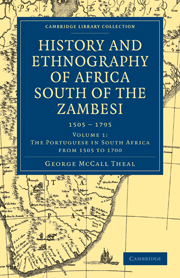Book contents
- Frontmatter
- PREFACE
- Contents
- MAPS AND PLATES
- CHAPTER I THE BUSHMEN
- CHAPTER II THE HOTTENTOTS
- CHAPTER III THE BANTU
- CHAPTER IV DESCRIPTION OF THE BANTU—(continued)
- CHAPTER V DESCRIPTION OF THE BANTU—(continued)
- CHAPTER VI SPECIMENS OF BANTU FOLKLORE
- CHAPTER VII DESCRIPTION OF THE BANTU—(continued)
- CHAPTER VIII ARAB AND PERSIAN SETTLEMENTS IN SOUTH-EASTERN AFRICA
- CHAPTER IX DISCOVERY OF AN OCEAN ROUTE TO INDIA
- CHAPTER X SUCCEEDING VOYAGES AND CONQUESTS
- CHAPTER XI OCCUPATION OF SOFALA AND MOZAMBIQUE
- CHAPTER XII INTERCOURSE OF THE PORTUGUESE WITH THE BANTU
- CHAPTER XIII DISASTROUS EXPEDITIONS UNDER BARRETO AND HOMEM
- CHAPTER XIV EVENTS TO THE CLOSE OF THE SIXTEENTH CENTURY
- CHAPTER XV KNOWLEDGE DERIVED FROM SHIPWRECKS
- CHAPTER XIV APPEARANCE OF RIVALS IN THE EASTERN SEAS
- CHAPTER XVII PROCEEDINGS OF THE DUTCH AND ENGLISH
- CHAPTER XVIII FRUITLESS SEARCH FOR SILVER MINES
- CHAPTER XIX EVENTS OF INTEREST FROM 1628 TO 1652
- CHAPTER XX WEAKNESS OF PORTUGUESE RULE IN SOUTH AFRICA
- Plate section
CHAPTER VI - SPECIMENS OF BANTU FOLKLORE
Published online by Cambridge University Press: 05 August 2011
- Frontmatter
- PREFACE
- Contents
- MAPS AND PLATES
- CHAPTER I THE BUSHMEN
- CHAPTER II THE HOTTENTOTS
- CHAPTER III THE BANTU
- CHAPTER IV DESCRIPTION OF THE BANTU—(continued)
- CHAPTER V DESCRIPTION OF THE BANTU—(continued)
- CHAPTER VI SPECIMENS OF BANTU FOLKLORE
- CHAPTER VII DESCRIPTION OF THE BANTU—(continued)
- CHAPTER VIII ARAB AND PERSIAN SETTLEMENTS IN SOUTH-EASTERN AFRICA
- CHAPTER IX DISCOVERY OF AN OCEAN ROUTE TO INDIA
- CHAPTER X SUCCEEDING VOYAGES AND CONQUESTS
- CHAPTER XI OCCUPATION OF SOFALA AND MOZAMBIQUE
- CHAPTER XII INTERCOURSE OF THE PORTUGUESE WITH THE BANTU
- CHAPTER XIII DISASTROUS EXPEDITIONS UNDER BARRETO AND HOMEM
- CHAPTER XIV EVENTS TO THE CLOSE OF THE SIXTEENTH CENTURY
- CHAPTER XV KNOWLEDGE DERIVED FROM SHIPWRECKS
- CHAPTER XIV APPEARANCE OF RIVALS IN THE EASTERN SEAS
- CHAPTER XVII PROCEEDINGS OF THE DUTCH AND ENGLISH
- CHAPTER XVIII FRUITLESS SEARCH FOR SILVER MINES
- CHAPTER XIX EVENTS OF INTEREST FROM 1628 TO 1652
- CHAPTER XX WEAKNESS OF PORTUGUESE RULE IN SOUTH AFRICA
- Plate section
Summary
Among a people without knowledge of letters historical legends and traditional tales occupy the same place as books with Europeans, and thus form perfect guides as to their powers of expression and thought. It will be necessary in succeeding volumes to relate the history of many tribes, as preserved by their antiquaries, so that examples of this portion of what may be termed Bantu literature need not be given here; but a few specimens of folklore tales will not be regarded as out of place. Readers must bear in mind that full grown men and women who have never been under European influence really believe many of the actors in these tales to have had an existence, so that they are not merely stories to amuse children.
THE STORY OF TANGALIMLIBO.
There was once a man who had two wives, one of whom had no children. She grieved much about that, till one day a bird came to her and gave her some little pellets. The bird said she must eat of these always before she partook of food, and then she would bear a child. She was very glad, and offered the bird some millet. But the bird said: “No, I do not want millet.” The woman then offered an isidanga (an ornamental breast-band which women wear), but the bird said it had no use for that. Then she got some very fine gravel and placed before the bird, which it received at her hands.
- Type
- Chapter
- Information
- Publisher: Cambridge University PressPrint publication year: 2010First published in: 1907

